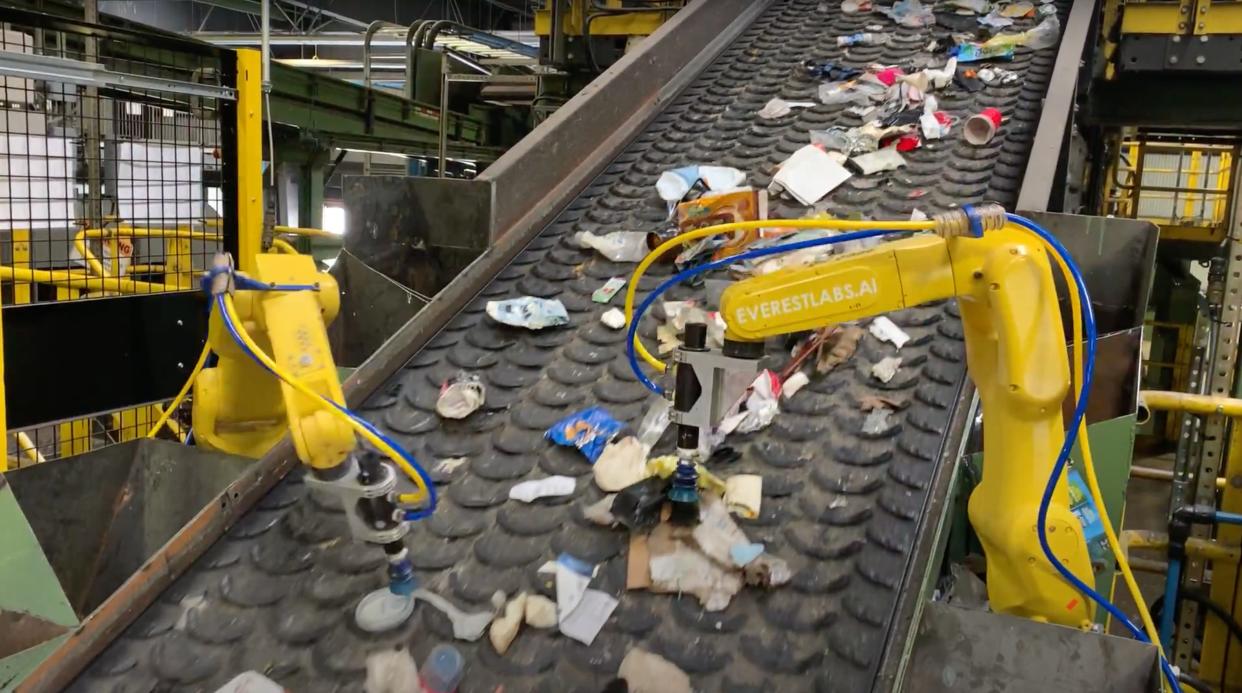AI could help the US be less terrible at recycling

US recycling centers lose up to $1 million annually due to valuable materials ending up in landfills.
AI startups, including EverestLabs, use robots and machine learning to recover more recyclables.
Aluminum and plastic are valuable as companies use more recycled content to hit climate goals.
It's well known that the US is bad at recycling.
Companies don't make enough recyclable containers and packaging, and people are confused about what can go in the blue bin. A patchwork of state and local collection systems doesn't help.
Even when aluminum cans, laundry jugs, and soda bottles do make it to recycling centers, some 27% of those potentially valuable materials still end up in landfills, according to a study by EverestLabs, an AI robotics company that's trying to solve the problem. That means US recycling centers could be losing up to $1 million every year on materials that could be sold to manufacturers and made into something new.
EverestLabs is among a group of AI startups disrupting the waste sector by using 3D cameras, machine learning, and robots in recycling centers to help recover more materials, boost profits, and ideally reduce greenhouse-gas emissions. If more aluminum, plastic, cardboard, and glass get recycled, fewer virgin materials would need to be extracted from mining and fossil-fuel production.
"Recycling plants have been using outdated technologies," JD Ambati, the CEO and founder of EverestLabs, told Business Insider. "They're focused on processing volume at a high throughput, which has the unintended consequences of a lot of material getting shoved into the conveyor lines that send the materials to the landfill."
As part of its study, EverestLabs spent two years monitoring the waste stream at dozens of recycling centers across the country. Each of the centers processed hundreds of tons of materials a day. The study measured losses of the most valuable recycled commodities, aluminum and certain types of plastic, but didn't cover cardboard or glass.
Ambati said aluminum and plastic are in high demand because companies selling packaged food, beverages, and household products are trying to use more recycled content to meet sustainability goals. Some US states, the European Union, and Australia also have regulations requiring a certain percentage of plastic containers to be made with recycled content to help reduce waste piling up in landfills and the environment.
About 76% of recyclables in the US are being lost in the trash at home, according to The Recycling Partnership, a nonprofit group that conducts research and works with companies and governments to fund new infrastructure and education projects. Only about 3% of recyclables are lost at processing centers, but new technology is needed to sort and process more materials, the group said.
"A million-dollar loss is substantial for these recycling plants," Ambati said, adding that the waste industry is starting to see the benefits of investing in AI. "They wanted to get comfortable with what this technology can do."
EverestLabs' customers are some of the biggest waste haulers and recyclers in North America, including Republic Services, Novelis, and Balcones Resources.
Last year, Caglia Environmental, which serves the Fresno and San Joaquin Valley region in California, installed EverestLabs' technology on one of its "last chance" lines to identify aluminum cans mistakenly destined for the landfill. It is expected to divert more than 1 million cans away from landfills and back to recycling plants that sell the material to manufacturers.
"Every time an aluminum can is thrown in the trash, it's just a horrendous waste to the Earth," Ambati said. "It is infinitely recyclable and can become part of your car door, washing machine, window frames, you name it. That is what people are missing."
Read the original article on Business Insider
